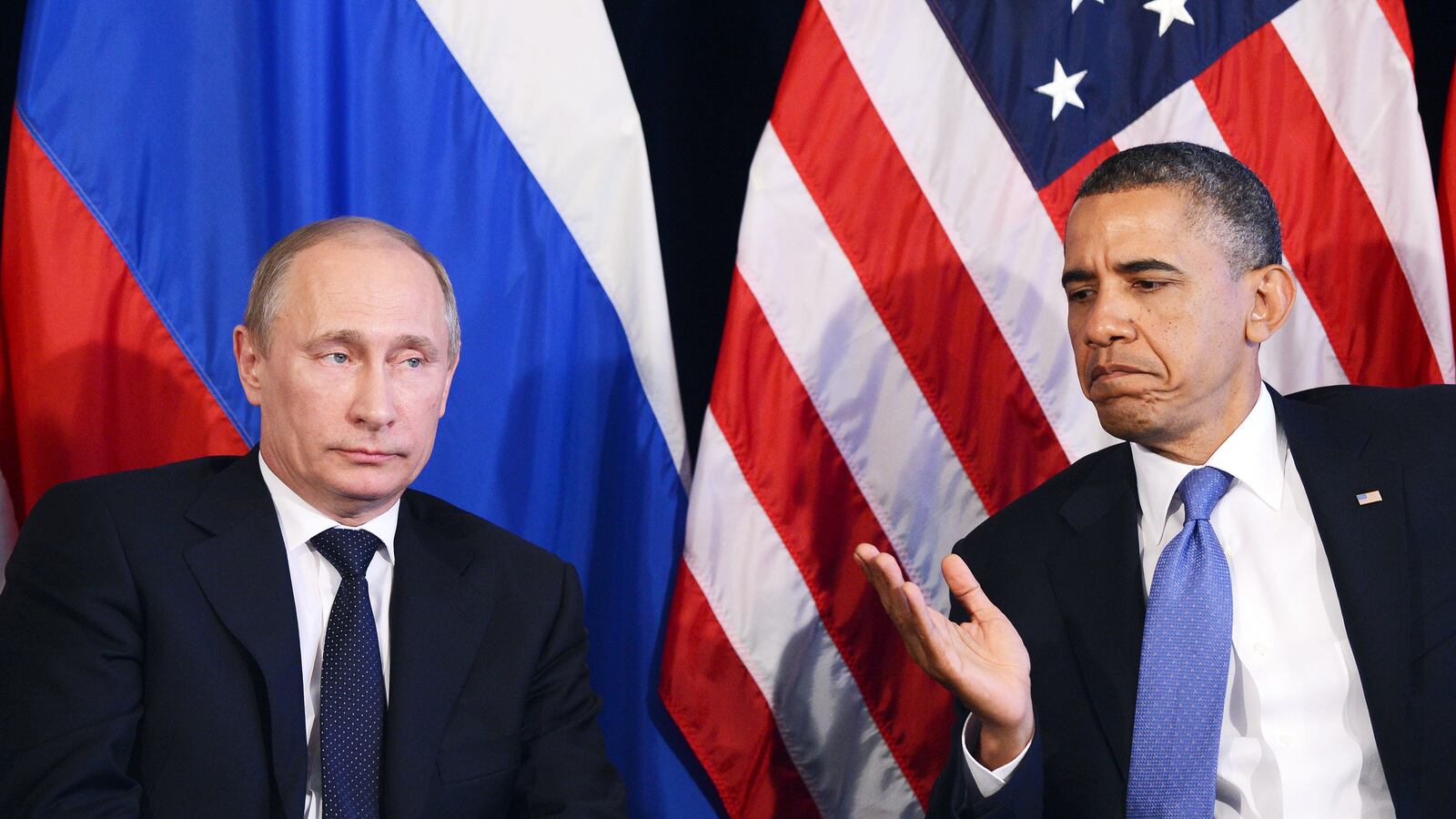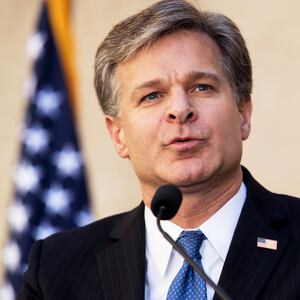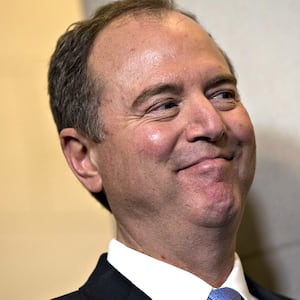The Obama administration thought its warnings to Russia about ceasing its electoral interference in 2016 worked, according to the latest installment of the Senate Intelligence Committee’s report into Russian election interference.
“Senior administration officials told the Committee that they assessed that their warnings to Russia before the election had the desired effect, and that Russia undertook little to no additional action once the warnings were delivered,” the report found.
It was a fateful miscalculation. Much of the damage had already been done, from the months-long data exfiltration from the Democratic National Committee server that became public in July 2016 to the social-media disinformation effort that persisted long after the election.
Indeed Special Counsel Robert Mueller’s investigation found that the genesis of the Russian disinformation campaign occurred in 2014—which is consistent with Obama officials telling the Senate committee that they worried a weaponized leak of a phone call involving top diplomat Victoria Nuland heralded a new era of Russian disinformation. Every additional congressional investigation and intelligence-official assessment, including FBI Director Christopher Wray’s last year, has concluded that Russian election-aimed efforts are expected in 2020.
The majority of the administration’s domestic response was to warn state election officials to harden their election infrastructure, while its response to Russia was to verbally warn them in private, in the fall of 2016, to stop the attack. A lack of Russian manipulation of the election data itself became confidence that the strategy had worked.
“[W]e had reason to believe they were in a position to do more and decided not to, which would lead me to conclude, although one can’t be 100 percent sure of this, that our deterrence had some effect,” Obama national security adviser Susan Rice told the Senate. Rice did not immediately respond to a request for comment.
Several committee Republicans—Jim Risch (ID), Tom Cotton (AR), Marco Rubio (FL), John Cornyn (TX), and Ben Sasse (NE)—assailed the “Obama administration’s inept response to Russia’s persistent and complex campaign to influence and interfere in the most recent U.S. presidential election.” They sidestepped highlighting an additional finding of the report: that fear of appearing partisan led the administration to inhibit its response.
The heavily redacted Senate report found that although the FBI had warned the DNC about potential intrusions “numerous times throughout 2015 and 2016” from a “malicious cyber actor,” many Obama administration officials were unaware of the Russian effort until the DNC publicized the data breach in July 2016. That was two months after then Director of National Intelligence James Clapper warned obliquely that foreign intelligence agencies were out to penetrate campaign data networks.
“The administration was not fully engaged until some key intelligence insights were provided by the IC [intelligence community], which shifted how the administration viewed the issue,” the report found.

The Obama administration’s response to Russia was to verbally warn them in private, in the fall of 2016, to stop attacks.
Kirill Kudryavtsev/GettyAs has been widely reported over the past three years, part of that shift involved then CIA Director John Brennan, in August and September 2016, separately briefing the small group of bipartisan congressional leaders involved in intelligence affairs known as the Gang of Eight. What resulted from the Hill was nothing—something that the Senate report euphemistically attributes to partisanship, but which one of its members attributes to Senate Majority Leader Mitch McConnell.
Oregon Democrat Ron Wyden, in his additional statement on the report, criticized the Obama administration for restricting the summer 2016 briefings to the Gang of Eight, rather than the full congressional intelligence committees. But Wyden also criticized “the Republican refusal to publicly acknowledge Russian interference” as a substantial contribution to the failed 2016 response.
“I believe that warning the public about a foreign influence campaign should not depend on the support of both parties, particularly when one of the parties stands to gain politically from that campaign,” Wyden said.
Bureaucracy, fueled by the typical reluctance to expand intelligence access, inhibited much of the Obama administration’s response. It inhibited options for a response, the Senate report found. White House officials, including Rice, were concerned that a more assertive public response could prompt the Russians to escalate by manipulating the actual election infrastructure that the federal government does not control. Additionally, administration officials were highly concerned that the intelligence agencies achieve maximum confidence in their assessment of Russian intrusion before making any statement that they might have to recant. Not until October, a month before the election, did Clapper and the Department of Homeland Security publicly accuse Russia of election interference.
The previous month, then FBI Director James Comey, whose own high-profile interference in the election was another fateful move, wanted to write an op-ed about the Russian intrusion. But according to then-deputy Andrew McCabe, who would soon be in Trump’s crosshairs, “[b]y the time he kind of got around to thinking about it seriously, he felt like the opportunity had passed and we were too close [to the election] at that point to have the intended effect on the electorate.”
There were other self-imposed “restrictions,” in the Senate report’s phrase. Among them, as has been widely reported, was the “highly politicized environment” that made the Obama team fear that their public warnings would themselves “undermine public confidence in the election”—by fueling Donald Trump’s frequent insistence that any loss he might suffer was the result of a rigged system. The Obama team, according to the Senate report, considered itself effectively checkmated, unable to come up with a compelling response and reluctant to risk making itself a spectacle distracting from Hillary Clinton’s campaign.
Their response was to attempt to act in a nonpartisan manner in an information environment where such a posture was less and less viable. They didn’t try to get new Russia sanctions through a GOP-controlled Congress in 2016 out of fear of Republicans crying foul; they would only impose unilateral sanctions after Trump won the election. The White House chief of staff at the time, Denis McDonough, told the Senate inquiry that the National Security Council “went out of [its] way to ensure that there was not a partisan veneer to any of the work.” Once out of office, McDonough assailed McConnell for not operating similarly. McDonough, Rice, and Homeland Security chief Lisa Monaco worried that an increased public warning would amount to “doing the Russians' dirty work for them.”
Monaco told the committee that McConnell reacted to a September briefing by the intelligence agencies on the election intrusion by stating “[y]ou security people should be careful that you’re not getting used.” The report says Monaco interpreted that “as suggestive that the intelligence regarding Russian efforts to interfere in the 2016 elections was being inflated or used for partisan ends.” Only Democrats Sen. Dianne Feinstein (CA) and Rep. Adam Schiff (CA), members of the Gang of Eight, would warn publicly of the Russian election incursion that fall.
In other words, while Russia may have hacked the election, Trump and GOP congressional leadership hacked the Obama administration’s brains.
The committee released its report on Thursday, the day after the Senate acquitted Trump for attempting to coerce Ukraine into aiding his 2020 reelection. A Senate Intelligence Committee official said the committee leadership, which at the end of last week had not received the intelligence agencies’ proposed redactions despite delivering it to them months ago, opted to wait for release until after impeachment was finished.
“The volume was going through the normal interagency review process and it was released when that process was completed,” said a spokesperson for the Office of the Director of National Intelligence.








